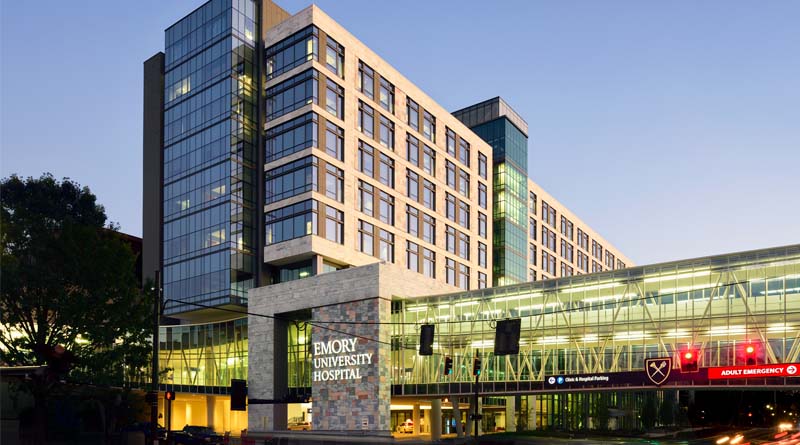Emory University Hospital Tower Awarded LEED Silver
By Aziza Jackson
ATLANTA — The Emory University Hospital Tower has been awarded LEED Silver certification (Leadership in Energy & Environmental Design) by the U.S. Green Building Council. It is the first Emory Healthcare building to be LEED certified at Emory.
Known as the most widely used green building rating system in the world, LEED provides the framework to create healthy, highly-efficient and cost-saving green buildings. LEED certification is a globally recognized symbol of achievement of sustainability.
The $400 million, 450,000-square-foot Emory University Hospital Tower, located at 1364 Clifton Road across from the current hospital, opened for patient care in the summer of 2017. The building meets high standards for air quality, energy efficiency and for using locally sourced materials. Its sustainable, inspirational and collaborative environment promotes healthy lifestyles, learning and community.
“Achieving LEED Silver certification is a testament to the hard work and dedication by our planning, design, architectural and construction teams in supporting sustainability,” says Bryce Gartland, MD, CEO of Emory University Hospital and Hospital Group President for Emory Healthcare. “This building saves on energy, water, and other resources while supporting human health, which creates a positive environment for all of those who work and receive care in this space.”
Buildings pursuing LEED certification earn points across several categories such as location and transportation, water efficiency, sustainability, materials and resources, energy and atmosphere, indoor environmental quality, innovation and more. Based on the number of points achieved, a project then earns one of four LEED rating levels: Certified, Silver, Gold or Platinum.
Key elements in the design and construction of the Emory University Hospital Tower include the following sustainable features:
- Project site located in close proximity to basic services such as restaurants, stores and public transit to encourage building occupants to walk instead of drive
- Low-flow indoor water fixtures reduce water consumption by an estimated 20 percent
- Energy-efficient exterior glazing systems allow for daylight to reach core areas throughout the building
- Materials used contain recycled and regionally manufactured content
- Energy-efficient features that allow for more than 20 percent energy savings
- Over 95 percent of construction waste recycled
- Special focus on indoor environmental quality for improving occupant health and well-being of employees
- Lead- and mercury-free facility
- Recycling program implemented
Since the recycling program began at the Emory University Hospital Tower, an average of nearly 30,000 pounds of cardboard and white paper are being recycled each month. The hospital’s Environmental Services team is responsible for collecting the recyclable material and taking it to a designated bin for pick-up.
“LEED Silver certification places Emory Healthcare and the Emory University Hospital Tower in a category above many others when it comes to design and building construction for hospitals,” said David Pugh, vice president for facility and space design for Emory Healthcare. “We are excited to receive this recognition and know it signifies Emory Healthcare’s commitment to green building design now and in the future.”
With a strong focus on sustainability, Emory University now has 34 LEED certified buildings that equal more than 4 million square feet. These buildings include: Candler Library, Candler School of Theology Phase I and Phase II, Claudia Nance Rollins Building, Emory Conference Center Addition, Health Sciences Research building, and James B. Williams Medical Education building.

